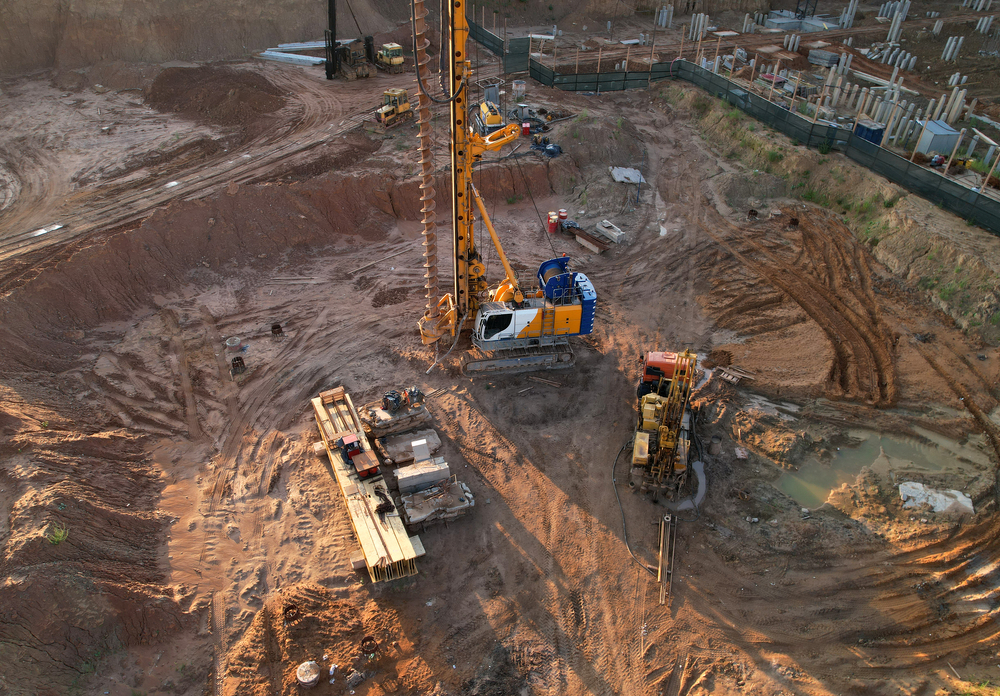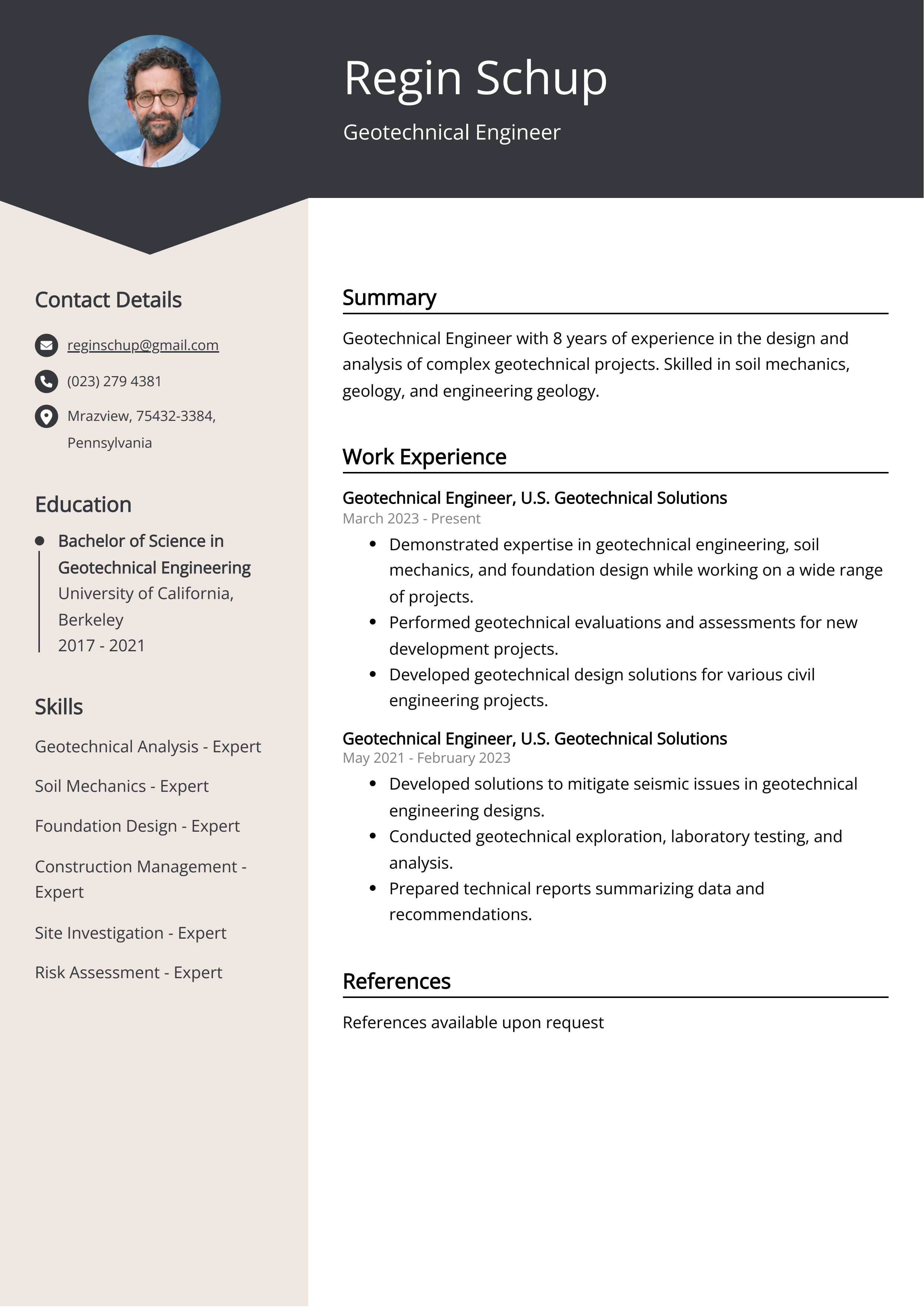Not known Incorrect Statements About Geotheta
Not known Incorrect Statements About Geotheta
Blog Article
Geotheta Can Be Fun For Anyone
Table of ContentsThe Ultimate Guide To Geotheta6 Easy Facts About Geotheta ExplainedNot known Details About Geotheta Geotheta for BeginnersGeotheta Things To Know Before You Buy

They conduct site investigations, gather samples, carry out research laboratory tests, and assess data to examine the suitability of the ground for construction jobs - Geo Tech Engineering. Based on their findings, geotechnical engineers give referrals for foundation style, incline stability, maintaining frameworks, and reduction of geotechnical threats. They work together with various other experts, such as engineers, architectural designers, and building and construction groups, to make certain that geotechnical factors to consider are incorporated into the total job design and implementation
By evaluating the actions and homes of soil and rock, they can determine possible geotechnical risks such as landslides, soil negotiation, or slope instability. Their experience helps protect against failings or crashes that might endanger lives and home. Here are some thorough obligations and obligations of a geotechnical engineer: Website Investigation: Geotechnical engineers conduct website investigations to collect information on subsurface problems.
They translate the data to understand the homes and habits of the soil and rock, including their toughness, permeability, compaction attributes, and groundwater problems. Geotechnical Analysis and Layout: Geotechnical engineers examine the data gathered during site investigations to analyze the security and suitability of the site for building and construction projects. They perform geotechnical computations and modeling to evaluate variables such as birthing ability, settlement, slope security, lateral earth pressures, and groundwater flow.
How Geotheta can Save You Time, Stress, and Money.
Foundation Design: Geotechnical engineers play an important role in creating structures that can safely support the intended framework. They examine the dirt problems and tons needs to determine the suitable foundation type, such as shallow foundations (e.g., grounds), deep foundations (e.g (https://flossy-rotate-3d1.notion.site/Why-Geotechnical-Engineers-are-Vital-for-Your-Construction-Projects-7c147cf012a34d1abe5134afbabc811f?pvs=4)., piles), or specialized strategies like dirt improvement. They think about variables such as negotiation restrictions, bearing capability, and soil-structure interaction to develop optimal foundation designs
They review building plans, display website activities, and conduct area examinations to confirm that the design suggestions are followed. If unforeseen geotechnical concerns emerge, they examine the circumstance and provide referrals for removal or adjustments to the design. Threat Evaluation and Mitigation: Geotechnical designers examine geotechnical risks and risks connected with the task website, such as landslides, liquefaction, or soil erosion.

Partnership and Interaction: Geotechnical designers work very closely with other professionals associated with a task, such as designers, architectural engineers, and building teams. Reliable interaction and partnership are vital to integrate geotechnical considerations into the overall task style and construction procedure. Geotechnical engineers offer technological experience, response queries, and make sure that geotechnical needs are met.
The 2-Minute Rule for Geotheta
Right here are some kinds of geotechnical engineers: Foundation Designer: Structure engineers specialize in creating and analyzing foundations for structures. They assess the dirt conditions, lots requirements, and site features to determine the most proper foundation type and style, such as superficial structures, deep structures, or specialized methods like stack structures.
They review the variables affecting incline security, such as soil residential or commercial properties, groundwater problems, and slope geometry, and develop approaches to avoid incline failings and alleviate threats. Quake Engineer: Quake designers specialize in evaluating and developing frameworks to stand up to seismic pressures. They examine the seismic danger of a website, evaluate dirt liquefaction possibility, and develop seismic design criteria to ensure the safety and resilience of frameworks throughout quakes.
They perform field screening, accumulate samples, and evaluate the collected information to identify the dirt homes, geologic formations, and groundwater conditions at a site. Geotechnical Instrumentation Engineer: Geotechnical instrumentation designers focus on surveillance and measuring the actions of dirt, rock, and structures. They install and keep instrumentation systems that keep an eye on aspects such as dirt settlement, groundwater levels, incline motions, and structural variations to analyze efficiency and supply early cautions of prospective problems.
Geotheta for Beginners
They perform tests such as triaxial examinations, combination examinations, straight shear tests, and leaks in the structure tests to gather information for geotechnical analysis and design. Geosynthetics Engineer: Geosynthetics engineers focus on the layout and application of geosynthetic materials, such as geotextiles, geogrids, and geomembranes. They utilize these products to enhance dirt stability, strengthen slopes, provide drain remedies, and control erosion.
They tend to be investigatory people, which implies they're intellectual, introspective, and analytical. They are interested, methodical, reasonable, analytical, and logical. Some of them are additionally social, meaning they're kind, charitable, cooperative, individual, caring, helpful, empathetic, sensible, and pleasant - Geo Tech Engineer.
In the workplace atmosphere, geotechnical engineers utilize specialized software devices to execute estimations, develop styles, and analyze data. They prepare records, testimonial job specs, communicate with customers and staff member, and you can try this out coordinate task tasks. The workplace setup gives a conducive atmosphere for research study, evaluation, and partnership with various other specialists associated with the task.
The Geotheta Statements
They often see project sites to conduct website examinations, assess geotechnical conditions, and collect data for evaluation. These sees include taking a trip to different places, occasionally in remote or difficult surfaces. Geotechnical designers may perform dirt tasting, conduct tests, and monitor building and construction activities to make certain that the geotechnical aspects of the task are being applied properly.
Geotechnical designers also function in specialized geotechnical research laboratories. In these facilities, they carry out experiments, carry out examinations on dirt and rock examples, and analyze the engineering residential or commercial properties of the products. Geotechnical research laboratory engineers function thoroughly in these environments, dealing with screening tools, operating instruments, and recording data. They work together with other lab personnel to make sure precise and reputable testing results.
Report this page